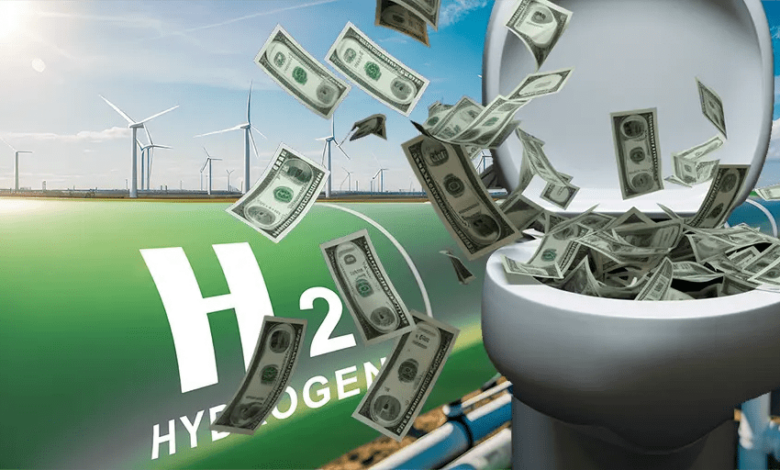Hydrogen in Australia – Is it worth it?

There is a lot of news these days about the so-called “energy transition” not happening. There is so much news on this topic that I could devote this entire blog to it alone and have plenty of time to spare. Expect more posts on this topic in the coming weeks.
To whet your appetite, today I take you to Australia, where we find the latest news on the inevitable collapse of the utopian dream of “green” hydrogen as a means of generating electricity from wind and solar.
But before we get into the latest news, let me reiterate my post of February 14, 2024 titled “When you crunch the numbers, green hydrogen just doesn’t cut it.” “Green” hydrogen is hydrogen produced by electrolyzing water using electricity generated solely from wind and solar. The idea is that you run an electrolyzer to produce “green” hydrogen on sunny, windy days when your wind turbines and solar panels are generating excess; then you burn the hydrogen to fill the gap in wind/solar production on cloudy days and calm nights. If all goes well, you have electricity to meet your needs 24/7/365, and there’s no carbon in the process from start to finish. In other words, energy heaven.
But has anyone crunched the numbers to see if this is economically feasible? By “economically,” I mean: generating electricity at or near the cost of our current electricity costs.
My February 14 post discussed the Biden Administration’s initiative to allocate $7 billion in government funding to “catalyze” $40 billion in private investment to boost manufacturing. “clean, cheap hydrogen.” How “low cost”? The government doesn’t quantify that, of course, but my post cites a guy named Jonathan Lesser who did a study and concluded that they could get “green” hydrogen for $2.74–$5.35 per kg of hydrogen, assuming they could buy wind/solar for $40 per MWh. That’s the goal, anyway.
Is $2.74 – $5.35 per kg of hydrogen cheap? I like how they quote hydrogen in different units than the usual units used for natural gas, so that no one can easily compare. Natural gas prices are usually quoted in dollars per MMBtu. What you need to know is that it takes 8 kg of hydrogen to produce 1 MMBtu of energy. So $2.74 – $5.35 per kg of green hydrogen equates to $21.92 to $42.80 per MMBtu. Over the past 5 years, US Natural Gas Prices has been below $4/MMBtu most of the time and has never been as high as $10/MMBtu. And to get to a green hydrogen price of $20–40/MMBtu, you need a wind/solar cost of $40/MWh. Recent contracts for wind and solar generators have called for guaranteed prices of $150/MWh or more. So adjust the $20–40/MMBtu accordingly. Green hydrogen will cost at least 10x the price of natural gas and could be as much as 20x.
Continue with the latest news from Australia. Australian energy blogger Joanne Nova reported yesterday (July 19) that a major green hydrogen project in that country had just “collapsed” with the loss of 700 jobs. I assume that by “collapsed” Ms Nova was referring to some form of bankruptcy or equivalent. Ms Nova’s headline was “The Hydrogen Titanic Just Collapsed in Australia Because Renewable Electricity Costs Are Too High”.
The project in question is the brainchild of Australian industrialist Andrew “Twiggy” Forrest and his company Fortescue. According to Ms Nova, Mr Forrest has “burned $2 billion (AU) to set up its Green Dream Hydrogen energy plan.” Forrest’s project was “the center of [the Australian Labor government’s] $2 Billion Hydrogen Manufacturing Headstart Program.”
Ms Nova quotes extensively from a major Australian newspaper called The Australian, which unfortunately has a paywall. I will only use Ms Nova’s excerpts. Here is the main excerpt:
For more than two years, Fortescue has been working hard to turn Forrest’s promise of turning green hydrogen into a commercial reality within a few years. Instead, as the economics around the soaring costs of electricity needed to produce green hydrogen began to wane, the deadlines have been pushed back. The mission has changed, followed by a succession of executives.
The problem is quite simply that the cost of producing “green” hydrogen is not competitive with natural gas. Nor can anything be done to bring the cost close to competitive. This quote is from another Australian source called Financial Assessmentalso behind a paywall:
Matthew Rennie, a former EY partner now an independent consultant, said his firm’s analysis showed that electricity prices and electrolysers – which use renewable energy to split water into hydrogen and oxygen – would need to be much cheaper to produce green hydrogen in Australia even at prices below $1.[AU]3 a kilogram. He said electricity prices would need to be lower than $[AU]The cost of a megawatt-hour and electrolyser would need to be more than halved to produce hydrogen at that level – still 50 per cent more expensive than the government’s ${AU]2 target for gas to be competitive.
$[AU]Target 3/kg equivalent to $[AU]24/MMBtu [thus about $US16] — 5 [or so] times the typical natural gas price in the US of $3-4/MMBtu. And they say to get there, they would need wind/solar prices of $3-4[AU]40/MWh [thus about $US27/MWh] and electricity prices have halved. Ms Nova reports that the two Australian states that generate the most electricity from wind and solar are South Australia and Tasmania, and they have wholesale electricity prices of $[AU]199/MWh and $214[AU]/MWh respectively [thus about $US133 and $US138 respectively]. So in the real world, the cost of this green hydrogen would be something like [ten to] 20 times or more the price of natural gas, instead of the dirt cheap price of 5 [or so] much higher than they expected.
Meanwhile, I keep reading things about green hydrogen being the wave of the future. But I can’t find any information about large scale manufacturing facilities for this stuff coming soon. Probably never will.
UPDATE, July 21: Commenter littleoil (I believe Australian) asked for clarification on which currency figures in this post are $AU vs $US. An Australian dollar is worth about 2/3 of a US dollar. I’ve added some clarification to the post.
Related




